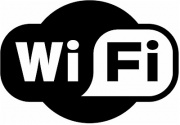Wi-Fi
From Computing and Software Wiki
Wi-Fi is a consortium that verifies 802.11b wireless network products interoperate, and a marketing term vendors use to sell their products.[1]
Wi-Fi is a subsection of the IEEE 802, a subcategory in the link layer of the TCP/IP Internet Protocol Suite. The Wi-Fi alliance is a trade group that owns the 'Wi-Fi' trademark, a symbol that certifies interoperability between wireless devices. Not every Internet product is Wi-Fi certified however, and there exists many devices that are able to interoperate wirelessly without the Wi-Fi logo. Some products have chosen to omit having Wi-Fi certification to avoid paying certification costs.
The use of Wi-Fi has boomed in recent years and is supported by a multitude of different devices. Laptops. game consoles, smartphones, printers and other peripherals usually have Wi-Fi certification.
Contents |
History
Wi-Fi was invented by Vic Hayes (dubbed 'the father of Wi-Fi') at the NCR Corporation/AT & T (later Lucent & Agere Systems), in 1991. Hayes had been designing IEEE standards for 802.11b, 802.11a and 802.11g and subsequent technology, initially meant for cashier systems. NCR initially released the technology under the name of 'WaveLAN' which operated in a range of 1Mbps-2 Mbps. [2]
Uses
Advantages and Challenges
Security
Dir
Sub 1s
Sub 2s
References
- Comer, D. E. (2006). Wi-Fi. Internetworking with TCP/IP (Fifth ed., pp. 419-441). Upper Saddle River, NJ: Pearson Prentice Hall.
- "Wi-Fi History". Retrieved on 2009-04-07
See Also
External Links
--Hamilr3 00:51, 10 April 2009 (EDT)

